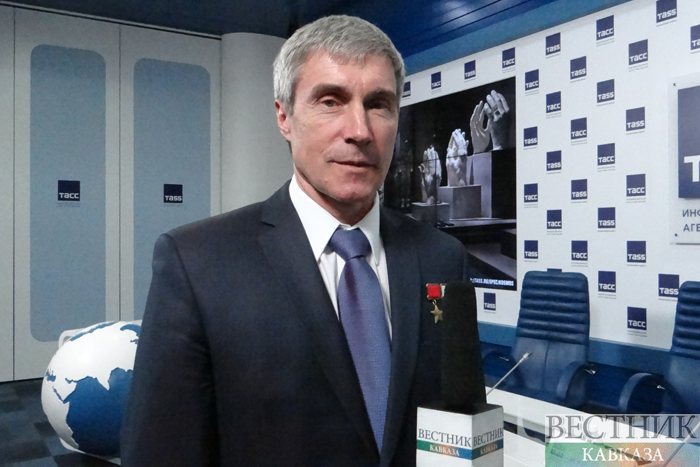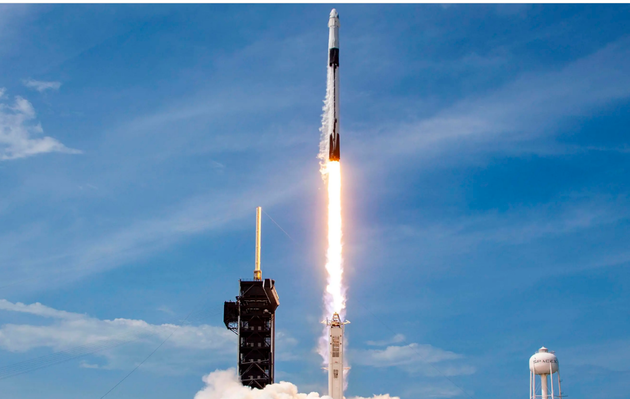SpaceX launched another quartet of astronauts to the International Space Station on Wednesday, sending off a crew that includes a Russian cosmonaut as part of a partnership between the United States and Russia that endures despite tensions in Ukraine. The crew is scheduled to spend about six months performing science experiments on the orbiting laboratory.
The Washington Post writes that the Falcon 9 rocket and Dragon spacecraft lifted off at noon from the Kennedy Space Center in Florida carrying two NASA astronauts, Nicole Mann and Josh Cassada, as well as Koichi Wakata from Japan and Anna Kikina of Russia. Shortly before liftoff, Mann, a Marine Corps colonel who became the first Native American woman to reach space, told mission control, “Let’s do this!” After the crew successfully reached orbit, she reported the flight “was a smooth ride uphill.”
Given the frayed relations between the United States and Russia, the flight is seen as yet another symbol that the countries are finding a way to cooperate in space. For more than 20 years, the countries have served as the main partners on the space station — sustaining a fragile, interdependent relationship that has served both countries’ space programs well. Last month, it was Russia’s turn to fly an American, NASA astronaut Frank Rubio, to the station. Rubio and a pair of cosmonauts launched in a Russian Soyuz rocket that arrived at the station Sept. 21.
During the space shuttle era, NASA flew Russian cosmonauts. And after the shuttle was retired in 2011, Russia transported NASA’s astronauts to and from the station. Wednesday’s flight was the first time a Russian flew on a SpaceX rocket. The space agencies are expecting additional crew swaps in the years to come, although the partnership has been in question because of Russia’s special operation in Ukraine.
Earlier this year, Dmitry Rogozin, the former head of Roscosmos, the Russian space agency, threatened to end the partnership and even intimated that since Russia is responsible for boosting the station and keeping it in the correct orbit, it could also cause it to come crashing down. NASA, though, largely ignored the talk, dismissing it privately as bluster, and said it would continue to keep the space station partnership going.
“Russian cosmonauts and American astronauts are all very professional,” NASA Administrator Bill Nelson said in June. “Despite the tragedies that are occurring in Ukraine, the fact is that the international partnership is solid when it comes to the civilian space program.”
That was a message driven home by NASA leaders in the days leading up to Wednesday’s launch. “When you are flying each other’s crew members, you know that you have a huge responsibility, that you’re promising to the other country to be able to ensure that you’re flying their crew member safely,” Kathy Lueders, NASA’s associate administrator for space operations, said. “At a working level, we’ve really appreciated the constancy and the relationship even during some really, really tough times geopolitically.”

During a call with reporters Monday evening, Sergei Krikalev, a former cosmonaut who serves as the executive director of Roscosmos’s human spaceflight programs, reiterated that Russia would continue its partnership on the space station through 2024, a date to which it had previously committed itself.
While Russia is working to design and build a new space station, he said, “we know that is not going to happen very quick,” so the country could “discuss extending our partnership in ISS.” During a news conference after the launch Wednesday, Krikalev said the launch marked a “new phase” of a relationship that began when the United States and the Soviet Union cooperated in space with the Apollo-Soyuz mission in 1975. “We started to cooperate many years ago, more than 40 years ago, and we will continue our cooperation as long as I can imagine,” Krikalev said. Asked if the more conciliatory tone was a concerted effort to ease tensions, he said, “The answer is yes.”
NASA has indicated it would welcome a continued partnership. It has said it plans to use the space station until 2030.
In July, the Kremlin replaced Rogozin as the head of Roscosmos, naming to the post Yuri Borisov, a deputy prime minister. Joel Montalbano, NASA’s ISS program manager, said Monday that Borisov has “made it very clear that Roscosmos has committed to meeting all their international commitments.” He said the Russian space agency has provided “excellent support” for the recent launches, “and we expect it to continue.”






